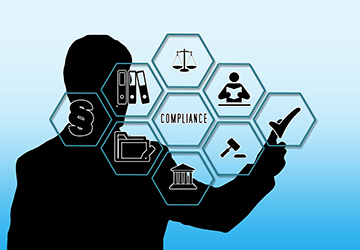Running a business has risks and rewards, no matter the size of your company. Sometimes, the risk is something you can predict, like delays in work, work hours limitations, equipment, etc., which you can arrange a backup for. Some risks, like natural disasters, aren’t predictable, but you still factor in your overall business management plan.
Therefore, companies manage these risks by being proactive, paying insurance premiums, and installing safeguards to mitigate the damage of these risks.
To understand these points in detail, please read the article.
What is Risk Management?
When you understand the instigation of risks, you can manage them properly to minimize damages or avoid them altogether. Typically, there are four main types of risks mentioned here:
Operational Risk Management
These types of risks involve your day-to-day work in your business, like communication with clients and customers, fulfilling orders, providing service, etc. It also includes the machinery involved so you get insurance tailored to your assets and workers and assign protocols to minimize the risks.

Strategic Risk Management
When your business grows and is being noticed, you make sure to follow the plan for even more growth. But if your competitor surpasses you using the same strategy, you must adapt to do better. You must research potential strategic risks and prepare to adjust if something similar happens.
Compliance Risk Management
When following rules and protocols, you ensure the method is proper and failsafe; otherwise, people can make mistakes violating some particular law. The better your employees are trained and the better the rules to support them, the fewer the risks.
Reputational Risk Management
You have a brand image, and you need to maintain that. You hold charities, enhance worker lifestyle, and more. You also need to keep your critical data safe and avoid frequent breaches. The personnel in your company should also be trained to adhere to your work and home ethics.
Why is Risk Management Critical for Businesses?
If the damages from an issue caused by a risk cost more than what you make, you might lose your business. Lawsuits, disasters, and other capital losses are some aspects that can cause you massive damage. Insuring such elements can help you regain your feet for a low monthly premium. Furthermore, implementing better protocols and practices to mitigate risks should always be paramount. Being proactive can save you from a lot of trouble later on.
Understanding the Risks Involved
Here are some of the most significant risks involved in any business size.
Biggest Types of Risks
While there are many risks in running any company or business, some are greater than others, and here are some of them you should know about.
Data Breaches – You don’t want your sensitive data to fall into the wrong hands, especially your business model, profits, employee and customer data, etc. Proper security protocols and firewalls can mitigate that.
Property Damage – Most of the time, we talk about natural disasters, but sometimes, things can happen during the high season of festivals and other similar events. Anything that can cause damages to your property must be insured to save you trouble in the long run.
Human Capital – You don’t train your employees to be more productive workers but also to help them learn how to work hard, don’t share sensitive information, etc. Sometimes, not trying hard to retain a valuable employee can cause a considerable amount of human capital to be lost.

Professional Service Mistakes – Companies sometimes ignore the flaws in their service, which can come back to bite them as a lawsuit. So, getting insurance for cases is essential when your customer isn't happy with the service you provide.
Furthermore, please follow these simple steps and tips to help you better understand some of the risks. Plus, they can help you plan accordingly to minimize risks, whether through insurance or better practices.
· Understand your brand and its risks during production, delivery, and final usage.
· Helping your employees and teams understand which risks are more prone to happen from one group than the other and what they should do to minimize it.
· Are there any safeguards and protocols implemented for the discussed risks? Do you need to upgrade the risk management system to better cater to your needs?
· Your team or employees should understand the costs of different risks. Once they do, you can plan practices or buy coverage to cover these risks as much as possible.
· Assign a weekly or monthly report to evaluate the risks and allow for periodic monitoring of activities that may cause the chance to increase.
How to Find the Best Insurance Solution for Your Business?
You may only need one insurance for a business, or you may need a complete plan to cover many things. Here are some considerations that you can make when defining the best solutions.
· Assess Which Risks are Yours – Understand your most valuable assets and focus on risks that might cause problems to them. You don’t need an insurance module if it doesn’t concern you.
· Legal Responsibilities – Are any risks more prone to happen in your business? Food poisoning in food and catering is one such issue. Understand which coverages support these cases.
· Coverage Amount – Understand the valuation of your company and its assets and find insurance according to the risks and damage amounts. But you need to budget it according to the premiums you can afford.
· Specific Providers – Many companies offer umbrella insurance, but looking for a provider that mainly caters to your niche is better.
Ending Comments
Running a business is challenging and can cause more problems than you can plan for if you don't know your risks and how to manage them. While some chances are out of your hands, best practices can mitigate others. Nonetheless, you should always get coverage for your most valuable assets.


